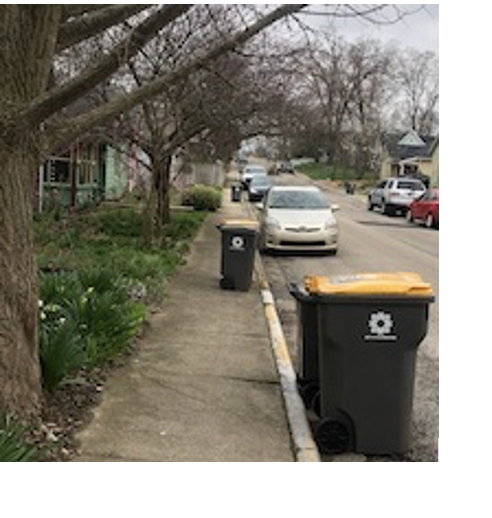Page last updated on June 11, 2023 at 5:31 pm
PROJECT UPDATE
Updated 6/11/2023
The ultimate goal of the Innovation Team is to provide a portfolio of ideas that the team thinks are worth exploring further. As part of the training, the team prototyped ONE of the portfolio ideas. The idea prototyped in September and October was to mark an optimal location for trash/recycling/yard waste bins for each household in locations that would keep the bins off of the sidewalk. The idea worked in theory and will be recommended for further exploration.
The barriers that need to be overcome for this idea to be implemented include that there are 14+ different configurations of households relative to yards, driveways, multi-use pathways, protected bike lanes, tree plots, narrow sidewalks with and without retaining walls, "normal" width sidewalks, and on-street parking; this means that not only is the "optimal" location for bins different for nearly each household, marking the optimal location must also consider placement on pavement, grass, gravel, sometimes on public property and sometimes on private property.
The full portfolio of recommendations from this group was presented to City Council on 4/12/2023. You can access that presentation here.
PROJECT BACKGROUND
The City of Bloomington 2018 Comprehensive Plan Goal 6.3 states: Improve the Bicycle and Pedestrian Network: Maintain, improve, and expand an accessible, safe, and efficient network for pedestrians, and attain platinum status as a Bicycle Friendly Community, as rated by the League of American Bicyclists.
Residents and planners alike acknowledge gaps in our ability to achieve this comprehensive plan goal.
The problem we are trying to solve:
- The problem is sidewalks are used as public goods but are not maintained as such because of unclear responsibilities between the City and residents that are inconsistently enforced.
- The problem negatively affects any users of the pedestrian network, but especially historically disadvantaged communities and residents with varying degrees of mobility.
- This is a problem because inconsistently maintained sidewalks cause dangerous conditions, prevent people from being able to navigate and enjoy its full length, undermining the City's pedestrian-friendly goals.
 What We Know:
What We Know:
- Response to resident feedback (uReport, emails, phone calls, in-person feedback) does not always include all the information the resident wants.
- Items frequently cited as sidewalk obstructions include trash/recycling/yard waste bins, scooters, hedge overgrowth, and low-hanging branches.
- City staff are stretched thin, so enforcement of sidewalk violations may not always be prioritized, leading to neighbors reporting neighbors...which doesn't feel good.
- Roads, trails, multi-use paths, and sidewalks are all public goods. Of those, only the sidewalks are maintained by adjacent property owners. Residents may not know the difference between a sidewalk and a multi-use path.
- Property owners may not be aware that they are currently responsible for the upkeep and repair of sidewalks adjacent to their property. Sometimes the first time a resident learns this is when they are cited for an infraction.
- City Planning, Engineering, and City Council recently adopted a different set of criteria for prioritizing the use of funding by the Council's Sidewalk Committee. The goal of the new criteria is to make the process more equitable, transparent, and defensible.
- Funds for sidewalk placement and maintenance come from a wide variety of sources. Sidewalks may be created or improved as part of another project (changes to a street, development of a property, connection to City of Bloomington Utilities, etc.)
With the help of curriculum and coaching in human-centered design supplied by Bloomberg Philanthropies, a group of eight City of Bloomington employees, one City of Bloomington Utilities and one Bloomington Transit employee spent a year (Feb 2022-Feb 2023) exploring the topic of how we might create systems that will ensure that all sidewalks are always navigable by everyone throughout the city?
PROJECT TIMELINE
- January-June 2022: Understand phase - includes targeted outreach to specific demographics for interviews and observations + review of policies and committee meeting minutes from Bloomington, IN as well as other cities.
Click here to view slides from the mid-point presentation.
- July-October 2022: Generate phase - new ideas sought; 2-3 community engagement meetings for brainstorming will be held.
July 8, 2022 - Community engagement pop-up in the City Hall Atrium 11a-1p
July 16, 2022 - Community engagement pop-up at Farmers' Market 10a-noon
July 28,2022 - Community brainstorming event 6-8pm at the Ferguson/Crestmont Boys and Girls Club. Open to anyone over 9 years old. FREE childcare provided. RSVP to the Director of Innovation - Devta Kidd - at [email protected].
[The project team also kept a survey of "big ideas for consideration" open through the month of July.]
December 13, 2022 - See a video of the final presentation (40m 52s). Access the slides from the final presentation.
April 12, 2023 - Final report and recommended next steps presented to City Council.
***
If you would like to reach a member of this team, please contact Director of Innovation, Devta Kidd at [email protected]
***
Sidewalk Innovation Team Members
Beth Cate - City of Bloomington Corporation Counsel
Brent Pierce - Housing and Neighborhood Development, Assistant Director
Clarence Boone - Parks and Recreation, Farmers' Market Coordinator
Devta Kidd - Office of the Mayor, Director of Innovation
Joe Bergin - Office of the Mayor, Innovation Summer Intern
Emily Herr - Engineering, Public Improvement Manager
Gabriel Holbrow - Planning and Development, Zoning Compliance Planner
Mallory Rickbeil - Planning and Development, Bicycle and Pedestrian Coordinator
Nathan Herr - City of Bloomington Utilities, Environmental Programs Specialist
Rick Dietz - Information and Technology Services (ITS), Director ITS
Shannon Riley - IU O'Neill School of Public and Environmental Affairs, O'Neill Innovation Fellow
Tim Fife - Bloomberg Philanthropies, Human-centered Design Coach
Zac Huneck - Bloomington Transit, Planning and Special Projects Manager
